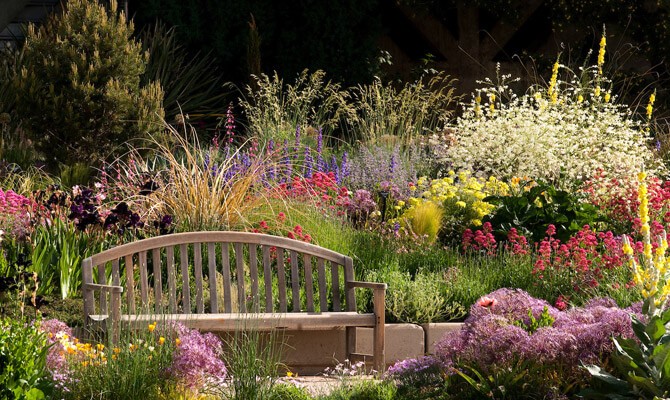
Deborah Evans on caring for historic landscapes and adapting to climate change
Heritage and landscape consultant Deborah Evans on the challenges of recreating the past and why all gardens need to evolve. Portrait Justin Foulkes
The biggest mistake people make is thinking there can be no change,” says Deborah Evans of her work as a heritage and landscape consultant. “I’m old enough to remember the huge brouhaha that ensued when Christopher Lloyd ripped out the rose garden at Great Dixter. It set the cat among the pigeons, but as a horticulturist he knew it no longer worked.”
Although Deborah has a masters in the conservation of historic landscapes, it was two roles as head gardener for prestigious properties that gave her a particular and unusual understanding of the horticultural realities of working with historic gardens.
In 1998, she was appointed head gardener at the open-air museum at St Fagans, near Cardiff, where in addition to restoring the formal 19th-century gardens around St Fagans Castle, Deborah was in charge of recreating gardens for the ‘village’ of rescued and re-erected houses that give visitors an insight into different aspects and periods of Welsh history. “This ranged from the garden of a peasant’s house, which would have been thrown up overnight, just containing simple herbs and potatoes, to a rich yeoman’s garden with pigs, chickens and beehives, and sophisticated crops such as sea kale and salsify.” Within the gardens of a row of miners’ cottages, Deborah and her tem grew flowers, such as auriculas, that are typical of those grown by 19th-century florist societies.
Her team also grew heritage potatoes, including the cultivar ‘Lumper’, a particularly blight-susceptible variety that contributed to the Irish Famine, and the Department for Environment, Food and Rural Affairs only permitted its inclusion as there were no commercial potato crops growing locally it could contaminate.
Some old roses do very well, but often David Austin and Peter Beales just do it better.
“These were just extraordinary things to grow,” says Deborah. “They also opened my eyes to the magic of plant breeding – and likewise when we grew old roses – where you can track generational improvements.” But she ripped out whole beds of ‘La France’, one of the great bedding roses of the 19th century. “It is just too disease prone. There is no point in growing it. Some old roses do very well, but often David Austin and Peter Beales just do it better.”
Deborah has no rose-tinted spectacles about the environmental standards of many historic gardens, an understanding that was brought home to her when in 2002 she was appointed as the first head gardener at Tyntesfield in Somerset after it was taken over by the National Trust. It was a massive task that involved managing 530 acres including woodlands and 11 acres of pleasure grounds with formal gardens, and a large derelict kitchen garden complex.
“We have this idea that the Victorian kitchen garden was wholesome and organic but in reality, it was anything but. It was a market garden, and they had to produce a lot so there was churn. They chucked chemicals around, happily trapped bullfinches because they ate fruit tree buds, and rolled peas in arsenic before they sowed them to stop the mice from getting them. By 2002, the ground at Tyntesfield was dead. It was completely worked out.” Alongside rejuvenating the derelict gardens and putting a robust programme of soil improvement into place, Deborah contributed to a groundbreaking multi-volume conservation plan that helped secure a £20 million grant from the National Lottery Community Fund.
Gardens and landscapes, by their very nature, are dynamic, even historic ones.
After Tyntesfield, she became one of Historic England’s landscape architects before setting up her own consultancy. In addition to guiding owners through the planning system, much of her work involves helping them care for wildlife, and prepare for climate change. “I am often working with woodlands and succession tree planting within estate landscapes, and there are trees we daren’t use now, such as ash and horse chestnut. More climate-resilient species, such as holm oak and sweet chestnut, are the substitutes, so some of the subtleties of our designed landscapes will be changing over the next 50 to 70 years. It is going to be interesting to see how the Pacific North West conifers, which are such a feature of our Victorian and Edwardian gardens, cope as it gets hotter.”
This is indicative of the many skills Deborah enlists when dealing with historic landscapes. “I have as much interest in the architecture, ecology, and cultural context of a site as I do of the horticulture. My role is helping people to appreciate what they have, and making them aware of the responsibilities and potential of their landscapes. Gardens and landscapes, by their very nature, are dynamic, even historic ones. They are going to change whether we like it or not. I try to act as a critical friend, finding viable solutions to modern problems.”
More like this
USEFUL INFORMATION
Find out more about Deborah’s work at delh.co.uk. Deborah will be course leader on the Managing Wildlife in the Historic Environment course (5-8 June 2023) at West Dean College in West Sussex. Tel 01243 818232, westdean.org.uk.
Image note: Many thanks to Lytes Cary Manor in Somerset where this image was taken. For details on visiting this National Trust Property go to nationaltrust.org.uk
Authors
Sponsored content

Niwaki bundle worth £57 when you subscribe
Subscribe to Gardens Illustrated magazine and claim your Niwaki bundle worth £57
*UK only

Container Gardening Special Edition
The Gardens Illustrated Guide to Container Gardening.
In this special edition, discover colourful flower combinations and seasonal planting schemes for pots designed by leading plantspeople, and essential know-how for container gardening success. Just £9.99 inc UK p&pBy entering your details, you are agreeing to our terms and conditions and privacy policy. You can unsubscribe at any time.

Gardens of the Globe
From botanical wonders in Australia to tranquil havens closer to home in Ireland, let this guide help you to discover some of the most glorious gardens around the world
By entering your details, you are agreeing to our terms and conditions and privacy policy. You can unsubscribe at any time.


